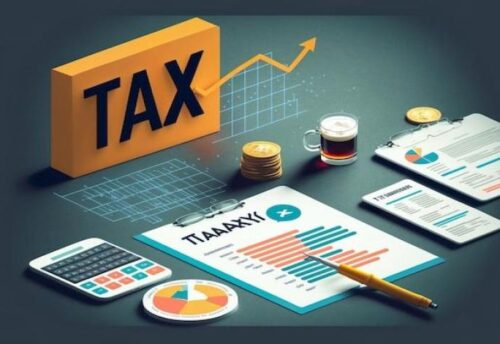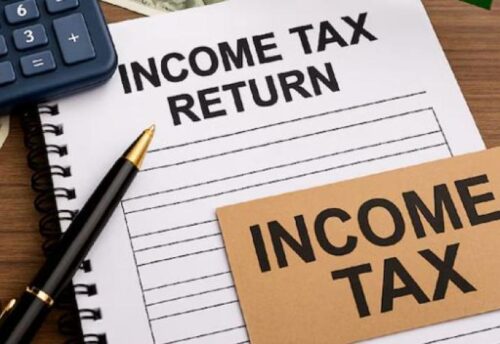
- 22/05/2025
- MyFinanceGyan
- 711 Views
- 3 Likes
- Cryptocurrency, Tax
Taxation on Cryptocurrency: Complete Guide to Crypto Taxes in India (2025)
Cryptocurrencies have become a prominent financial innovation, offering decentralised, borderless, and high-return opportunities for investors. However, in India, these Virtual Digital Assets (VDAs) are now heavily regulated, and profits from crypto activities are taxable. The Finance Act of 2022 introduced specific taxation rules for VDAs, with updates continuing into FY 2024-25.
This article explains how crypto taxes work in India, how to report them, what is taxable, how to calculate your tax liability, and key compliance pointers for Indian crypto investors in 2025.
What are Cryptocurrencies?
Cryptocurrencies are digital or virtual currencies that use cryptography for security and operate on decentralised blockchain technology. Unlike fiat currencies (INR, USD), they are not issued or regulated by any government or central bank.
Popular examples include:
- Bitcoin (BTC)
- Ethereum (ETH)
- Dogecoin (DOGE)
- Polygon (MATIC)
- Ripple (XRP)
Are Cryptocurrencies Considered Currency or Asset in India?
Under Indian tax law, cryptos are classified as “Virtual Digital Assets (VDAs)” and not legal tender or currency. The Finance Act, 2022 introduced Section 2(47A) defining VDAs to include:
- Cryptocurrencies
- Non-Fungible Tokens (NFTs)
- Tokens generated via cryptographic means
💡 VDAs exclude: Gift vouchers, loyalty points, and mileage points.
How is Cryptocurrency Taxed in India (FY 2024-25)?
Flat 30% Tax Rate:
- All income from transfer of VDAs (buy/sell/swap/gift) is taxed at a flat 30% + 4% cess
- No distinction between short-term or long-term gains
1% TDS (Section 194S):
- TDS is deducted at 1% of the sale consideration, not profit
- Threshold: ₹50,000/year for individuals (₹10,000 for specific categories)
No Set-Off or Deductions:
- Losses cannot be adjusted against other income or crypto gains
- Only cost of acquisition is allowed as a deduction
Gifts of Crypto:
- Taxable in the hands of the recipient unless received from a relative or under exempt occasions (e.g. marriage, will)
How to Calculate Tax on Crypto Transactions?
Profit = Sale Price – Purchase Price
Example:
- Buy ETH at ₹40,000
- Sell at ₹70,000
- Profit = ₹30,000
- Tax = ₹9,000 (30%) + 4% Cess
Important:
- 1% TDS is applicable on sale, not profit
- Report under Schedule VDA while filing your ITR
What Crypto Transactions Are Taxable in India?
You are liable to pay tax if you:
Crypto Bookkeeping & Compliance:
Crypto traders often operate across multiple exchanges and wallets. To comply with Indian tax laws, bookkeeping software is essential. It helps you:
- Import all transactions (deposits, withdrawals, trades)
- Auto-detect income (staking, trades, rewards)
- Manually classify pending entries
- Generate reports (capital gains, holdings, etc.)
Understanding TDS (1%) on Crypto Transactions – Section 194S:
TDS is not applicable on transactions with non-resident entities under specific conditions.
Tax on Crypto Gifts:
Crypto can be gifted using:
- Wallet transfers
- QR code
- Gift tokens
Tax on Airdrops:
Example:
- Receive 1,000 tokens at ₹10 FMV → ₹10,000 income (taxed under slab)
- Sell for ₹25,000 → ₹15,000 gain taxed at 30%
Tax on Crypto Mining:
- Taxed as income when tokens are received
- FMV as per Rule 11UA used for valuation
- Cost of acquisition is zero
- No deductions for electricity or hardware
Later sale: 30% tax on gains (Sale Price – FMV)
Tax on Crypto Staking (Proof of Stake Earnings):
- Earnings from staking = 30% tax as income
- When staked tokens are later sold, 30% tax on capital gains
- Moving tokens between wallets or pools = not taxable
Crypto Losses: Can They Be Set Off?
No. As per Section 115BBH, losses from crypto cannot be:
- Set off against any income (even from crypto)
- Carried forward to future years
- Used to reduce taxable profits
Example:
- Gain on BTC = ₹20,000 → Tax = ₹6,000
- Loss on ETH = ₹10,000 → Ignored
Filing ITR for Crypto Income in India:
- Report under Schedule VDA
- Include all transaction details (buy/sell price, dates, etc.)
- File Form 26Q or 26QE for TDS compliance
- Maintain records of wallet addresses, exchange reports, and P2P transactions
Conclusion: Crypto Taxation in India (2025):
Cryptocurrency taxation in India is stringent and highly regulated. Whether you’re a casual trader, long-term investor, miner, or NFT enthusiast, it is crucial to:
- Understand your tax obligations
- Maintain accurate transaction records
- Comply with TDS rules
- Report your income accurately in ITR
Consult a tax advisor or CA familiar with crypto taxation for personalised assistance.



